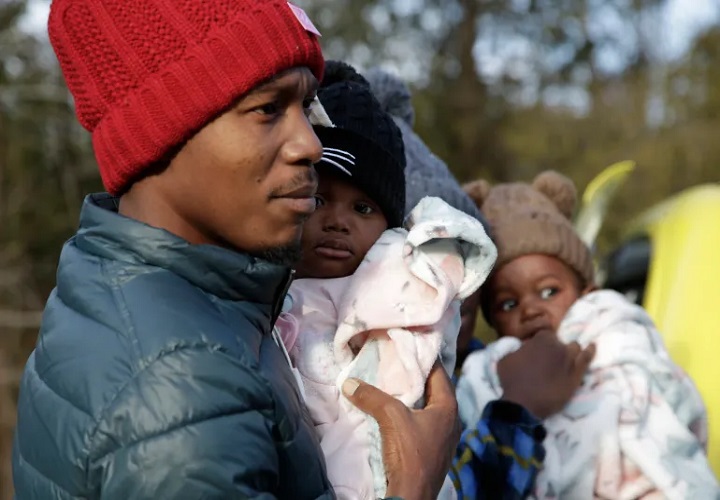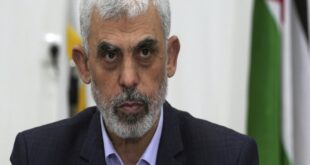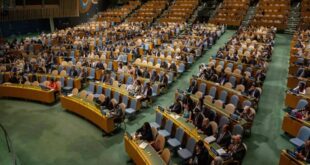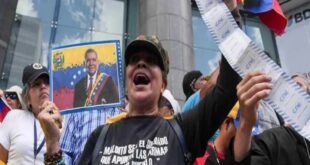
It won’t stop undocumented migrants. But it will kill many more families trying to cross the frigid border.
Razak Iyal and Seidu Mohammed recently celebrated becoming Canadian citizens. Their stories have been intertwined since they crossed the Canada-United States border to seek asylum near Emerson, Manitoba, on Christmas eve of 2016.
Their lives nearly ended on that frigid night at the side of a rural road. The two men survived but both lost all their fingers to frostbite. Others have not survived. On March 31, two families perished at the Quebec-US border, including an infant and a three-year-old.
Stories like Razak and Seidu’s have captured intense political and public attention in Canada. Why aren’t people going to official ports of entry? The answer is that the law, specifically the Safe Third Country Agreement (STCA) between the US and Canada, deters people from using official border entry points because they will be turned away and denied the opportunity to make a refugee claim.
Canada has acknowledged these crossings by erecting pop-up border stations like one at Roxham Road, facilitating the movement of migrants. Quebec’s premier and main opposition leader have called for this makeshift port of entry to be shut down. And now, as part of US President Joe Biden’s recent visit to Canada, the two countries have decided to do just that, under a renegotiated STCA that came into effect starting midnight on Friday, March 24.
Now anyone crossing any point of the Canada-US land border to make a refugee claim will be turned away. They will not be able to make a refugee claim and will be sent back to the US side of the border. Until now, this agreement only applied at official land ports of entry which pushed people seeking asylum to cross at unofficial points and made the remote Roxham Road that dead-ends at the boundary line between Hemmingford, Quebec, and Champlain, New York, a legal and well-travelled option.
The newly expanded STCA now applies across the entire Canada-US land border, including areas between official ports of entry and certain bodies of water. Anyone making an asylum claim within 14 days of crossing without authorisation or valid immigration status will be brought back to a US port of entry and excluded from being able to make a claim in Canada.
This expanded protocol is a response to heightened political rhetoric that paints people crossing at Roxham Road as illegal and taking advantage of Canada’s immigration system. In recent weeks, this processing centre has become a lightning rod for debates about migration and border policy in Canada.
Yet while Roxham Road will no longer be a viable crossing route for refugee claimants, this will not stop people from seeking safety and security across the border. The legality of the additional protocol will be tested in courts. In fact, the STCA’s constitutionality is before the Supreme Court of Canada right now.
Advocates argued that the agreement not only infringes migrants’ rights under the Charter of Rights and Freedoms, but also violates Canada’s international legal obligations under the 1951 Refugee Convention which calls on states to provide a meaningful opportunity to ask for refugee protection.
Rather than suspending the agreement as many refugees and their advocates have long called for, the Canadian government has instead expanded it even though its legality is in question. Further, rather than trusting the tools and procedures at our official ports of entry, the Canadian government has chosen a less efficient and inhumane way to manage the movement of people at the border.
The story of Roxham Road is not separate from the wider global context of increasing anti-migration sentiments and stricter border controls, underpinned by systemic racism and discrimination, even as more people are forced to flee their homes due to instability, war and environmental degradation.
Policies like the STCA are short-sighted because stricter border policies, militarisation and surveillance do not stem migration. Instead, people desperate for protection simply take more dangerous routes, leading to loss of life, broken families and lifelong trauma.
Iyal and Mohammed survived their journey across a remote and dangerous segment of the Canada-US border. Their refugee claims were accepted in 2017, opening their pathway to becoming citizens this March.
They narrowly avoided freezing to death. Others were not so lucky, dying at the border.
How many deaths and other casualties of the STCA will it take before Canada reconsiders its reliance on increasingly restrictive and short-sighted policies? For the answer is blowing in the frigid wind along the US-Canada border: the Safe Third Country Agreement offers no real safety to either desperate people or the nations involved.
- Jamie LiewLawyer and associate professor, University of OttawaJamie Liew is a lawyer, Director of the Institute of Feminist & Gender Studies and Associate Professor at the Faculty of Law, University of Ottawa. Twitter: @thechaiyun
- Petra MolnarAssociate Director of the Refugee Law LabPetra Molnar, lawyer and Associate Director of the Refugee Law Lab, York University and Fellow with Harvard’s Berkman Klein Center for Internet and Society Twitter: @_PMolnar
- Julie YoungCanada Research Chair (Tier 2) in Critical Border Studies and Assistant Professor in the Department of Geography and Environment, University of Lethbridge.Julie Young is the Canada Research Chair (Tier 2) in Critical Border Studies and Assistant Professor in the Department of Geography and Environment, University of Lethbridge.
World Opinions – Aljazeera




 World Opinions Débats De Société, Questions, Opinions et Tribunes.. La Voix Des Sans-Voix | Alternative Média
World Opinions Débats De Société, Questions, Opinions et Tribunes.. La Voix Des Sans-Voix | Alternative Média




